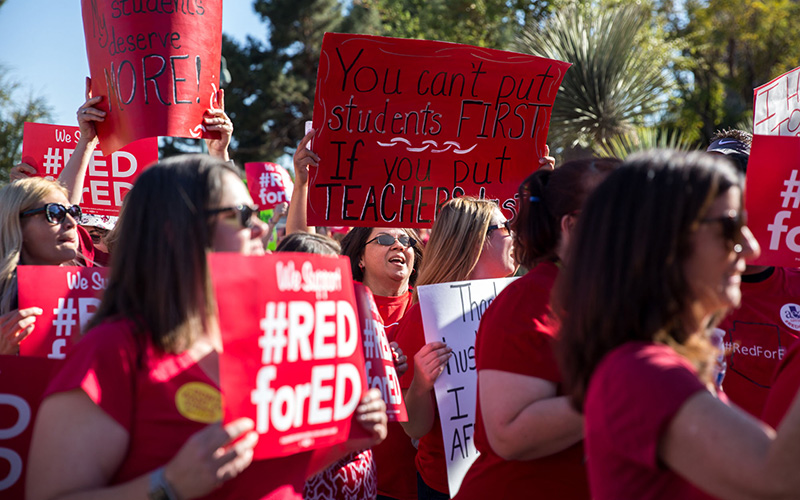- Slug: BC-CNS-Prop Plaint,780
- File photo available (thumbnail, caption below)
By DANIEL PERLE
Cronkite News
WASHINGTON – Eight weeks after it ordered a school-funding tax initiative pulled from this fall’s ballot, the Arizona Supreme Court explained its 5-2 ruling Friday in a 23-page opinion that critics blasted as “a very political decision.”
More than 270,000 people signed petitions for Proposition 207, which would have raised taxes on higher-income earners to fund education. But the court in August ordered the initiative pulled from the ballot because it said language on the ballot petitions was confusing and had the potential to mislead voters.
In one of two dissents, Chief Justice Scott Bales pushed back against the majority’s decision that “voters should not be allowed to consider a legislative proposal supported by hundreds of thousands of petition-signers.” If language on the petition was ambiguous, he said, it should be “a subject of debate between proponents and opponents … seeking to persuade voters.”
The court’s justification of its Aug. 29 order removing the proposition from the ballot did little to calm outraged supporters of the initiative.
“I think it was a very political decision,” said David Lujan of the Arizona Center for Economic Progress and one of the authors of the initiative. “It sends a signal to the voters that the system’s rigged and that it’s rigged against Arizona’s schools.”
But critics of the initiative said the court had little choice but to strike the proposition, which they said violated state law for initiatives.
“The courts in Arizona will apply the laws as they’re written,” said Kory Langhofer, one of the attorneys who challenged the initiative. “If you’re trying to get on the ballot for a measure you should make sure you follow all the rules of getting on the ballot.”
The initiative came in the wake of #RedForEd rallies across the state this spring, that featured teacher and student walkouts to protest Arizona’s chronically low funding for state schools.
Gov. Doug Ducey and legislative leaders responded in April with a plan to raise teacher salaries by 20 percent by the year 2020. But critics said that would not be enough to fill the state’s pressing school needs.
The InvestInEd initiative would have raised an estimated $690 million a year for schools by levying a 3.46 percentage point increase in the state income tax rate on individuals making at least $250,000 or households making $500,000 or more. The tax rate would have risen by 4.46 percentage points on individuals with annual incomes of $500,000 or households with incomes over $1 million.
State law requires initiative petitions to include a 100-word description of the proposal, and critics said the language on Prop 207 petitions was misleading on the effect and cost of the tax increases. The court agreed.
The majority said the petition language failed to note that the initiative would have affected the state’s inflation-adjusted indexing of income, which would have led to virtually all taxpayers seeing an increase, not just the rich.
“Most taxpayers would have a small portion of their income taxed in a higher bracket, resulting in a small increase on most taxpayers,” the majority wrote, citing a Joint Legislative Budget Committee analysis.
The ruling also noted that the petition language misrepresented the actual tax increase by referring to it in percents instead of percentage points – so that what the petition called a 3.46 percent increase in taxes, translated to a 76 percent increase in an individual’s tax rate.
That would “yield a significant danger of confusion,” the court said.
The ruling comes less than two weeks before Election Day and adds fire to the debate over judicial retention elections, with two judges who are on the ballot next month among the five who voted to reject Prop 207.
But one Republican political consultant said he does not think this will increase the odd that Justices John Pelander and Clint Bolick will be voted off the bench in November.
“I don’t believe this is going to pour lighter fluid on a fire that was already raging,” said Jason Rose, the consultant.
Critics have also noted that Ducey added two additional justices to the court in 2016, upping the total number from five to seven with the appointments of Justices Andrew Gould and John R. Lopez IV. The lack of their votes would not have made a difference, however, in the court’s 5-2 decison.
But supporters of the measure said this result shows the state’s leadership has “broken” the ability of voters to have input on the state’s education system.
“This decision creates new law that in effect gives politicians, through the Legislative Council, the right to interpret and describe any citizen initiative regardless of the intent of the drafters,” wrote InvestInEd co-chair Josh Buckley in a statement on the group’s Twitter page.
For more stories from Cronkite News, visit cronkitenews.azpbs.org.
^__=
Web links:
_ Molera v. Reagan: https://www.azcourts.gov/Portals/0/OpinionFiles/Supreme/2018/CV180218APEL.pdf
_ August order: https://www.azcourts.gov/Portals/21/Elections/CV-18-0218-APEL.pdf?ver=2018-08-30-082417-400
_ Arizona petition law: https://www.azleg.gov/viewdocument/?docName=https://www.azleg.gov/ars/19/00102.htm
_ 20 by 2020 plan: https://azgovernor.gov/governor/news/2018/05/governor-ducey-letter-arizona-parents-teachers-and-school-leaders
_ InvestInEd statement: https://twitter.com/investinedaz/status/1055915484908929024
^__=
Arizona school funding was the focus of teacher and student walkouts in #RedForEd rallies this spring. Proposition 207 would have addressed that by raising as much at $690 million a year for state schools, but the Arizona Supreme Court ordered the initiative removed from the ballot over faulty petition language. (Photo by Melina Zúñiga/Cronkite News)
